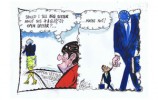Race riots are an English – and loyalist – problem and political leadership is required
Even this week as the media, print and electronic, reflected on last week’s race riots, newspapers and websites were still talking about “riots across the UK” or “riots throughout cities in Britain and Northern Ireland” or, from the geographically and politically illiterate, “riots across the UK and Northern Ireland”.
Well no, actually. There were race riots in English cities and some, but not all, loyalist districts of Belfast.
Hardly anyone has asked: why this geographical limitation? It wasn’t until August 11 that BBC Scotland produced a piece trying to explain “why Scotland avoided far-right unrest”.
As historian and broadcaster David Olusoga explained, “a knowledge of the long and ugly history” of race riots might have helped journalists and commentators to explain what many of them initially described as “protests”.
Brian Feeney: Race riots are an English – and loyalist – problem and political leadership is required
The road to unionist unity runs through Quebec – David McCann
Disturbances fell squarely into the long tradition of English race riots and, as Olusoga says, whether it’s 1948, 1958 or now 2024, “they always have the same motivation – racism and nativism”.
Yes, the rioters attacked and tried to burn some hotels housing asylum seekers, but they attacked mosques and people in cars or on foot perceived to be Muslims. They wrecked and looted businesses........
© The Irish News





















 Toi Staff
Toi Staff Gideon Levy
Gideon Levy Andrew Mitrovica
Andrew Mitrovica Tarik Cyril Amar
Tarik Cyril Amar David Hutt
David Hutt Neve Gordon
Neve Gordon Patrick Gathara
Patrick Gathara Moncef Khane
Moncef Khane Dr Ramzy Baroud
Dr Ramzy Baroud Rami G Khouri
Rami G Khouri Sabine Kinkartz
Sabine Kinkartz Brad Glosserman
Brad Glosserman Ghada Ageel
Ghada Ageel Brahma Chellaney
Brahma Chellaney Steve Wenick
Steve Wenick Ayala Weinberg
Ayala Weinberg Stefano Lusa
Stefano Lusa
